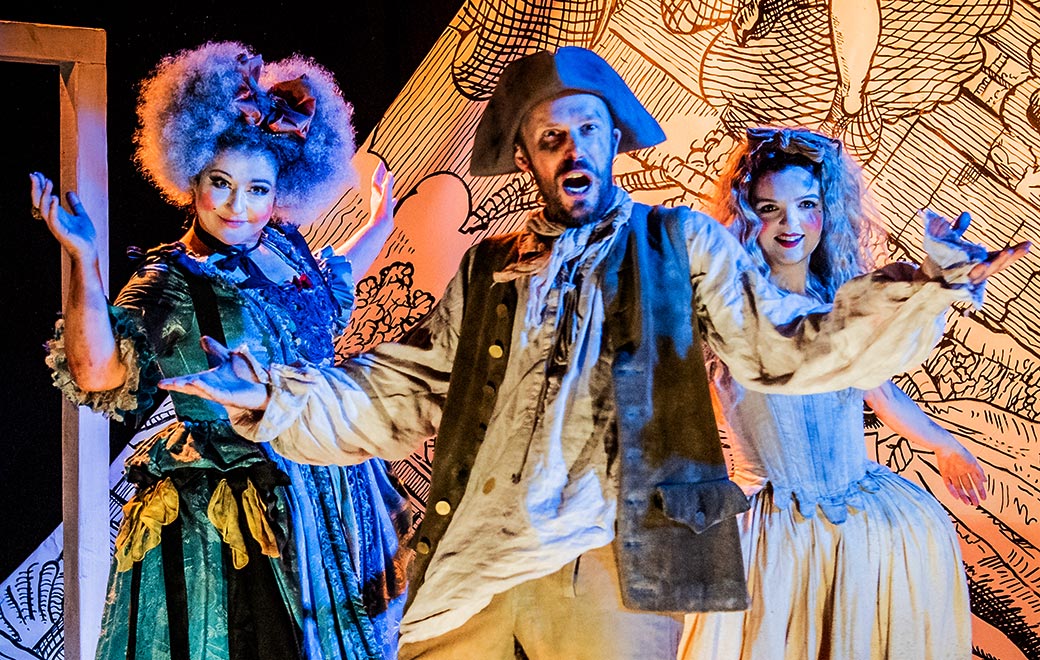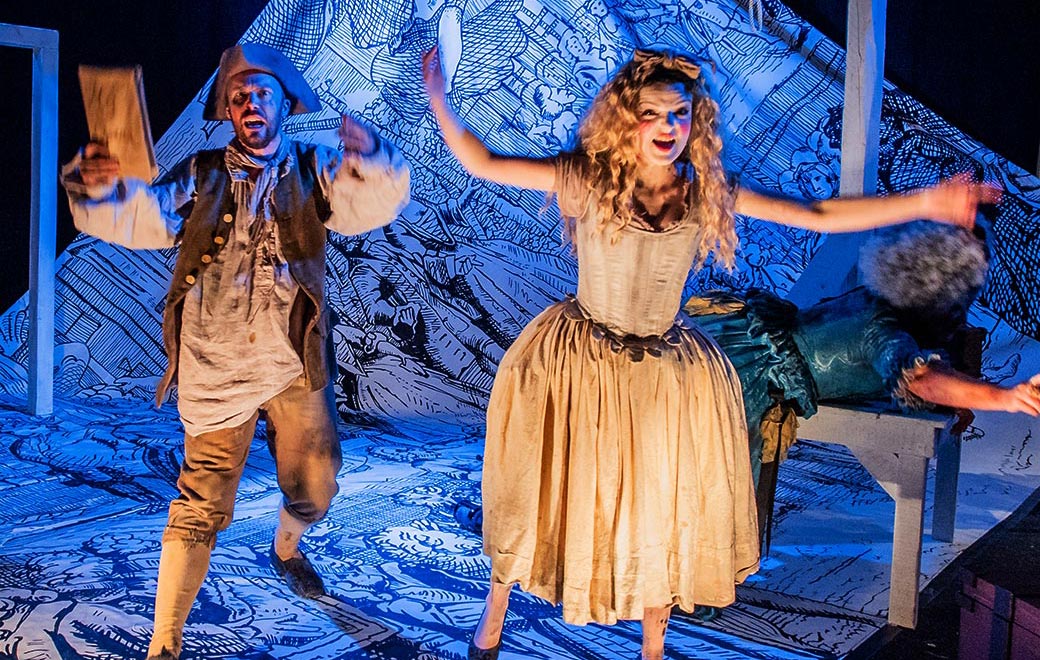Nigel Jarrett was at Blackwood Miners’ Institute for a performance of a new version of John Gay’s The Beggar’s Opera – Mid Wales Opera’s Mrs Peachum’s Guide to Love & Marriage.
One advantage of taking a blunderbuss to the platoon of ne’er-do-wells in John Gay’s The Beggar’s Opera and leaving a few of them to rattle on is the impossibility of losing its relentless cynicism. The opera is of its (18th-century) time and for all time, as successive adaptations with music by divers hands, including Benjamin Britten’s, have demonstrated. Bertolt Brecht and Kurt Weill turned it into The Threepenny Opera. In their consummate reduction for Mid Wales Opera, the company’s artistic director, Richard Studer, and music director, Jonathan Lyness, have settled its savage ironies on just three characters: Mrs Peachum; her daughter Polly; and the authorial Beggar himself, who doubles as the Peachums’ servant Filch and acts as a Chorus. It’s a triumph of its kind.
In truth, the original opera, or ballad opera, is over-long in all particulars. Gay was not a satirist. For satire, one needs two sets of conflicting moral circumstances with which to make comparisons; Gay evidently thought that corruption and base morals were universal, his viewpoint misanthropic. Such unshakeability can make an audience yawn, hence the many attempts to present the work so that it doesn’t move from the edge of its seat and its members are sometimes tempted to cheer and cajole. There were almost seventy songs in Gay’s libretto, with music from different sources. The dialogue was spoken and the songs advanced the opera’s bleak theme in music, unlike traditional operatic songs (arias) which are meditations on where the characters find themselves in the narrative.

The story is as sparse as its initial exegesis was long. Mrs Peachum handles the Fagin-like Mr Peachum who himself handles stolen goods and the gang which does the thieving. Their daughter Polly has secretly married Macheath, a highwayman, an occurrence only of advantage in her mother’s mind if Macheath is ‘impeached’ and hanged and Polly becomes a rich widow. Not that Macheath would bequeath much, but in Mrs Peachum’s ironic view widowhood in every case and, by implication, every class of society, is the only point of marriage. And so on. Macheath escapes from jail and all ends operatically – and, of necessity in MWO’s version, rapidly.
Studer’s reduction for touring to small theatres has necessitated a re-write. Among the characters lost from the original is Lucy Lockit, the jailer’s daughter and Macheath’s lover. Gay has Lucy attempting to poison Polly after Macheath’s escape. In this version, which takes a magnifying glass to the relationship between the distaff Peachums, it is Polly who tries to poison her mother. At least Mrs P and her daughter are at each other’s throats as much as Lucy and Polly were. For Studer, as indicated in his version’s re-title, Mrs Peachum’s solution to Polly’s ‘predicament’ is what the opera is really about when divorced from its contemporary allusions to Whig politics and to the hollow superiority of the lumpen-proletariat’s superiors. The latter is what attracted Brecht to The Beggar’s Opera and allowed him to depict its characters – Studer has discarded among many others Suky Tawdry, Jemmy Twitcher, Wat Dreary, Jenny Diver and Mr Peachum himself – as victims. (Weill once lamented the loss to an unspecified but higher moral crusade of Mrs Peachum’s drive and energy.)
To say that the Studer/Lyness conception is flawless is only a tad over-stated. Lyness’s score, based on the opera’s songs, is an absolute joy of miniaturisation, replete with sophisticated stylistic borrowings. The portrayals of Irish mezzo Carolyn Dobbin as Mrs Peachum, Welsh soprano Alys Meredid Roberts as Polly, and English baritone Johnny Herford as The Beggar and Filch, are uproariously pantomimic in Jill Rolfe’s super costumes, and a reminder that Gay had actors rather than singers in mind when he was deploying his characters on stage. The score incorporates 34 tunes from the original that Studer has included in his revised text. Lyness refines and enhances them, not least in his questing for the humanity behind the depravity. Their accompaniment is performed with proprietorial enthusiasm by Lyness himself at the keyboard, a violinist (Nia Bevan), a bassoonist (Oliver Galletta, depping at Blackwood for Alexandra Callanan) and a swivelling percussionist (Max Ireland). Studer’s set is touring chamber opera to perfection, its Hogarthian angular backdrop reminding us of the work’s social background, including the drinking of a handy bottle of gin in the Peachum household as the toffs pretend not to notice. Relevant, or what? A formalised gallows overshadows the goings-on as both direct reference to what awaits Macheath and his nefarious rabble and a symbol of what lies at the bottom of the gin bottle. Neither marriage nor widowhood is likely to save Polly from dependence on it and in Studer’s depiction her feistiness, and therefore her ultimate fate, is only a twitch short of matching her mother’s.

If one had to enter a caveat, as they say, it would refer to the telescoping of a three-act opera into one act and the crashing dénouement that results. It’s as though Studer had imposed a time limit on himself and was determined to make it to the finishing line, come what may. Probably not true, though. Like all theatrical reductions of this sort, it’s not so much ‘what you see is what you get’ as ‘what you get is what you see’. Without a knowledge of the work on which it’s based, Mrs Peachum’s Guide to Love & Marriage might seem bizarre and surrealistic. But if you didn’t know The Beggar’s Opera – and MWO goes far to point out the antecedents – you might wish to after seeing this outstanding brevity; the concentration of a story’s theme and its comic downstage propulsion, and the jettisoning of its longueurs. Mrs P’s guide is pretty straightforward and the cast’s final comments on the conventions of opera make them perceptive and the audience, even modern ones, slightly uneasy.
MWO is canny and shrewd in practising the art of touring opera to small venues. In the second half of this show – Mrs Peachum is not very long – the singers explore related themes. This is partly to give its audience a taste of what the company has in the offing (a production of Mozart’s The Marriage of Figaro) and to make sure it’s getting value for money on the night. Mrs Peachum itself would be worth the admission price. The three segue, among others, into less picaresque depictions of romance, with extracts from the upcoming opera (Roberts singing Susanna’s Deh vieni, no tardar winningly) and Don Giovanni (Roberts and Herford); an exquisite performance by Dobbin of the traditional Irish song She Moved Through the Fair; and the gem of a portrayal by Herford of Pierrot’s Tanzlied from Korngold’s opera Die tote Stadt. The three end, mutatis mutandis, in Peachumland or thereabouts, with Get Me To The Church on Time from My Fair Lady. I was slightly mocking of this make-weight second-half procedure when MWO presented Ravel’s L’Heure Espagnol; it was topped with an Iberian pot-pourri that lacked only the distribution of sombreros. But MWO has a way of changing one’s views of what can be done to make opera more accessible. Long may it continue.
Upcoming dates:
Hay Festival winter weekend (November 28); Emlyn Williams Theatre, Theatr Clwyd (Nov 29); Theatr Colwyn, Colwyn Bay (Nov 30); Theatr Gwaun, Fishguard (December 5); Castle Hall, Bridgnorth (Dec 6); Presteigne Assembly Rooms (Dec 7 – Sold Out)
You might also like…
John Metcalf OBE talks to Carl Griffin about his seventh opera, Under Milk Wood and, in particular, his approach to creating the libretto and the importance of sound. Under Milk Wood has been five years in the making and will premiere in the UK at the Taliesin Arts Centre, Swansea 3 April 2014, for a three-day run before touring around Wales.
Nigel Jarrett is a former newspaperman. He is a winner of the Rhys Davies prize and the Templar Shorts award for short stories, and is represented in the Library of Wales’s anthology of 20th–and 21st-century short fiction. He’s also written a poetry collection and two volumes of stories. Among others, he writes for Acumen poetry magazine, Jazz Journal, and on music and other subjects for the Wales Arts Review. His pamphlet of stories, A Gloucester Trilogy, has just been published by Templar Press.
Header Photo Credit: Bob Workman



 Enjoyed this article? Support our writers directly by buying them a coffee and clicking this link.
Enjoyed this article? Support our writers directly by buying them a coffee and clicking this link.







